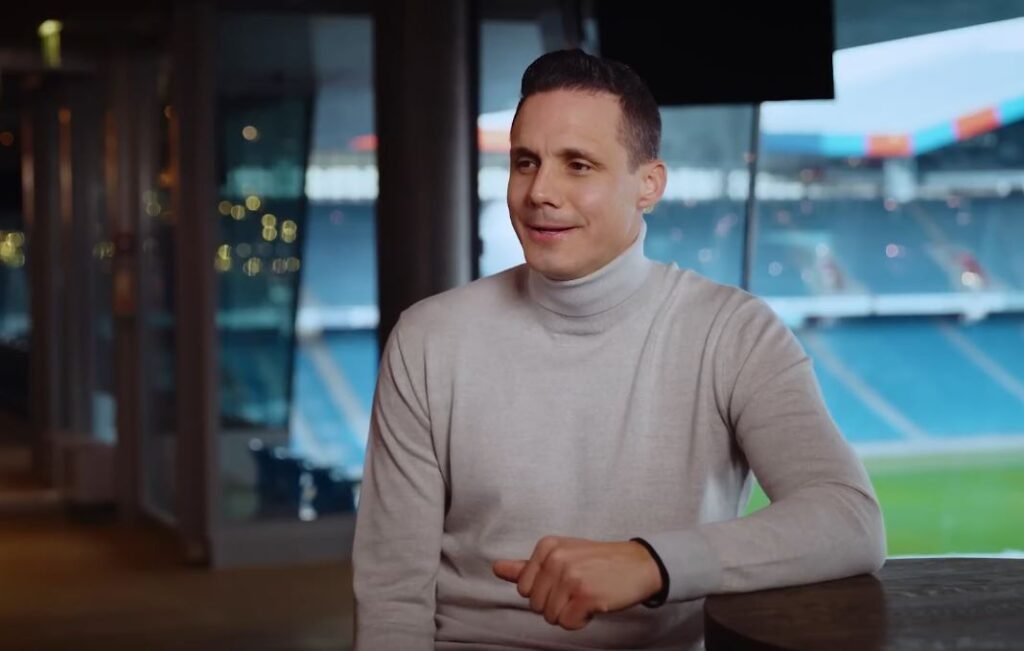
David Degen’s transformation from professional football player to business executive serves as an example of how drive can lead to long-term success. His estimated net worth, which ranges from sixteen to twenty million Swiss francs, is proof of his ability to make well-considered decisions and his keen sense of business.
He once wowed supporters on the field as a winger; today, he dominates boardrooms with the same intensity that characterized his playing days. Degen made a bold and well-thought-out move in 2021 when he purchased 91.96% of FC Basel Holding AG for 18.4 million francs. Remarkably self-assured but modest about the size of his investment, he declared, “It’s my money.”
| Category | Information |
|---|---|
| Full Name | David Degen |
| Date of Birth | February 15, 1983 |
| Age | 42 years |
| Nationality | Swiss |
| Birthplace | Liestal, Switzerland |
| Profession | Entrepreneur, Former Footballer, Sports Executive |
| Playing Position | Winger |
| Clubs Played For | FC Aarau, Borussia Mönchengladbach, BSC Young Boys, FC Basel |
| Current Role | Owner and President, FC Basel Holding AG |
| Estimated Net Worth | Around 16–20 million CHF |
| Known For | Leadership at FC Basel and strategic real estate ventures |
| Family | Twin brother, Philipp Degen |
| Reference | https://www.blick.ch/sport/fussball/superleague/so-reich-sind-die-neuen-aktionaere-der-fcb-im-kohle-check-id16525394.html |
His decision was motivated by vision rather than nostalgia. He believed that FC Basel was a financial entity that could be revitalized with careful management, not just a club. He significantly enhanced the club’s financial situation by emphasizing efficiency. Basel quickly had a transfer surplus of more than 70 million euros, which was one of the most remarkable comebacks in Swiss football history.
Degen’s method is especially novel since it combines economics and emotion. He is a precise leader rather than an extravagant one. According to him, every investment must be extremely effective, and every choice must be based on reason rather than emotion. He created a structure that restored confidence and liquidity by forming strategic alliances and keeping a careful watch on transfers.
Diversification is his secret. Degen’s financial foundation was strengthened by his involvement in real estate and sports management endeavors long before he took over FC Basel. The club was stabilized with an eleven-million-franc capital injection thanks to his cooperation through Horizon2026 AG, an investment group co-founded with Ursula and Andreas Rey-Krayer and businessman Dan Holzmann. Despite being quiet at first, this financial stewardship action showed his unwavering dedication to sustainability.
Like his playing days, his management style combines accuracy and instinct. He favors well-considered tactics over taking chances just for show. His meager annual salary of about 300,000 francs shows a commendable amount of restraint—a focus on performance rather than profit. He clarified, “I’m not on the club’s payroll,” stressing that his objective was to support Basel rather than make money.
The club’s reputation has benefited greatly from the change under Degen’s direction. His transfer strategy has moved the emphasis to developing young players, bringing Basel’s model into line with contemporary European teams that value growth and astute marketing. His vision was validated by players like Thierno Barry and Renato Veiga, who helped to achieve remarkable sales of over fifty million francs in a single summer.
Beyond money, Degen’s choices demonstrate a very keen sense of brand value. Xherdan Shaqiri’s 2024 return to Basel was not just a sentimental move; it was a calculated move meant to boost sponsorships and fan interaction. He struck a balance that many club executives miss by turning financial gain into emotional loyalty.
His experience reflects a larger pattern among contemporary athletes who have made the move into leadership roles and achieved remarkable outcomes. Similar paths have been taken by individuals like Edwin van der Sar and Oliver Kahn, but Degen stands out for his Swiss pragmatism. He exemplifies how sports leadership can be both analytical and emotional, which is a highly adaptable blend that guarantees long-term resilience.
Degen stands out even more for his idea of community-based ownership. He frequently discusses democratizing football finance and the possibility of FC Basel shares being owned by supporters in the future. These concepts show a move toward openness and shared accountability, which are values that are becoming more and more important in contemporary sports administration.
His journey is characterized by financial experts as a model for aspiring executives. Degen based Basel’s comeback on independence and strategic effectiveness rather than on billionaire backers. He maintained competitive ambition while drastically lowering financial vulnerabilities by cutting back on wasteful spending and streamlining revenue streams.
There is a personal resonance to his story as well. Degen, who grew up in Liestal with his twin brother Philipp, was taught the value of perseverance and teamwork at a young age. His business philosophy has smoothly incorporated these values, which have their roots in sports. “Success on the field means nothing if you can’t sustain it off the field,” he once said. His legacy is defined by that sentence, which is subtly profound.
Degen’s wealth may not be comparable to that of multinational tycoons, but it symbolizes something much more significant: the capacity to turn experience into business. His influence—how he has changed Swiss football culture by bringing a sense of responsibility, balance, and purpose—is a better indicator of his wealth than his financial success.
Under his leadership, FC Basel has come to represent a contemporary athletic institution that is ethically sound, financially stable, and culturally integrated. Like Degen himself, the change has been gradual and self-assured, based more on consistency than show.
